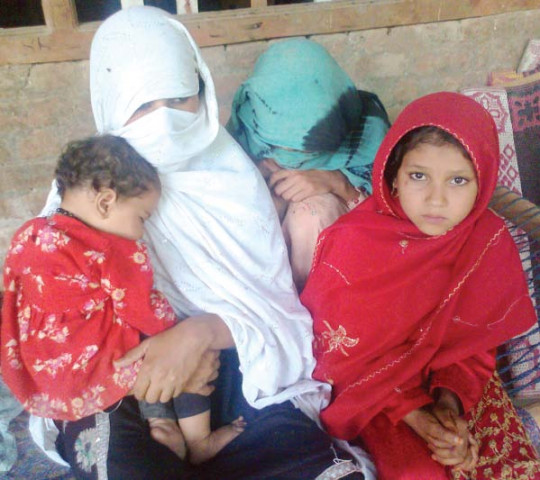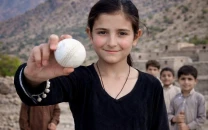With her guardian angel gone, Zeba struggles to protect six daughters and make ends meet
A Swat flood victim lives under pain and misery.

Living alone is the worst fate for a woman with six children, particularly in a male-dominated society. “There is greed and thirst in everyone’s eyes surrounding me, and sometimes, it is impossible to escape from their clutches,” Pari Zeba told The Express Tribune, trying hard to hold back her tears.
Zeba, 26, a mother of six, all girls, once lived a content life with her husband, Rasool, in Sijban Matta.
She described her husband, who sold plastic utensils, as a man of words and character, a man who loved his family and made every effort to take care of them.
Their simple yet happy life ended abruptly after floods hit the Swat valley last July. Rasool was out collecting wood near a river with other villagers. The rising tide left them trapped and finally pulled them in at daybreak.
His body was fished out of the water in a town downstream and buried there. With him went the only caretaker of Zeba’s family.
“He loved his daughters. Without him, life has been nothing but trouble. Taking care of and feeding my family is one problem but protecting my children is the real challenge,” Zeba said.
It has been a year since the floods came, leaving hundreds of families at the mercy of the elements. Even today, the infrastructure remains in shambles.
Zeba is very worried about her daughters. “I think about their future. How will I protect them and educate them?”
None of Rasool’s family could attend his funeral. “I still don’t believe he’s dead. He left the house that afternoon after we had tea. He was smiling and promised to come back before dark. We didn’t even see his body. He broke his promise,” she said with tears rolling down her cheeks. “He was my angel.”
Though the government has paid compensation money to Pari Zeba, she does not know the exact amount as the money went into her brother-in-law’s account.
She is hopeful that her daughters will get the money when they grow up. However, like many widows in the country, her financial well-being is in the hands of her in-laws. “Please don’t say anything to him (her brother-in-law), he will get annoyed,” Zeba said reluctantly.
Pari Zeba and her daughters have no clear picture of the future. Her neighbours often help her by giving her food, but she is insecure and helpless. “Days go by, but every night I feel like I’m dying a little inside.”
Published in The Express Tribune, July 28th, 2011.



















COMMENTS
Comments are moderated and generally will be posted if they are on-topic and not abusive.
For more information, please see our Comments FAQ